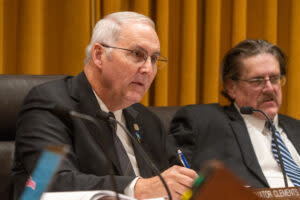Nebraska Gov. Jim Pillen. April 18, 2024. (Zach Wendling/Nebraska Examiner)
PLATTSMOUTH, Nebraska — Nearly half a year after saying he didn’t “believe in welfare,” Nebraska Gov. Jim Pillen says the state will accept as many federal dollars as possible.
Pillen’s latest directive to his cabinet members has been to find federal funds that have “no strings attached” so the Cornhusker State gets “more than our fair share.” Doing so, he has said, could increase investments into state services, promote growth or reduce property taxes.
“Green light, pedal to the metal,” Pillen recalled telling his cabinet.
In December, explaining his then-rejection of federal funding for Summer Electronic Benefits Transfers funds for low-income Nebraska families, Pillen said similar programs already existed, and he criticized a lack of “touch points.”
Months later, the governor, alongside the Nebraska Department of Health and Human Services, Department of Education and many Republican state senators, announced they had found a “Nebraska way” and would move forward with the summer food program.
The U.S. Department of Agriculture praised the Nebraska proposal and the addition of “touch points” that Pillen desired be added.
About 175,000 students, or 80,000 households that meet certain criteria, such as free or reduced lunch eligibility, are expected to benefit from a card loaded with $120 in grocery-buying benefits for the summer.
Oklahoma origins to philosophy
Pillen told the Nebraska Examiner his response was “not a shift at all” from his December stance because his initial opposition came over the program’s execution, not its goals. He said “touch points” could increase participation in other programs and better support families.
During various town halls, Pillen has continued to pitch his desire to provide another $1 billion in property tax relief, shaving off a total 40% of the state’s approximately $5.3 billion collected each year by this year’s end.
Pillen said he plans to call a special session this summer and add to the first $1 billion in reduced property taxes through credits on income taxes and community colleges.
Three weeks into becoming governor in January 2023, Pillen said, he talked with Oklahoma Gov. Kevin Stitt and learned that Stitt had a personal lobbyist in Washington, D.C., who helped the state draw in more federal dollars.
Nebraska, Stitt told the state’s freshman governor, was second to last nationwide in getting its share of federal funds, while Oklahoma was in the top 10.
Pillen recalled finding that fact “appalling” and told attendees at a town hall in Plattsmouth that if Nebraska didn’t accept the funds, they could go to California.
“We’re working incredibly hard to get more than our fair share of federal dollars back home,” Pillen said. “Vastly different than what’s gone on for a lot of years.”
Past governors rejected federal help
Nebraska’s previous governor, now-U.S. Sen. Pete Ricketts, R-Neb., rejected federal funds for emergency rental aid related to the COVID-19 pandemic. State lawmakers tried to force the state to accept the funds, a move Ricketts vetoed, and the Legislature fell short of a veto override.
The amount of relief started at $120 million for Nebraska, with many of those funds being distributed to other states, before Pillen eventually accepted a remaining $48 million for Nebraska’s 91 smaller counties after he took office, in July 2023.
“That’s $70 million that was left on the table that could have gone to helping people remain housed, and then that money goes into our communities,” State Sen. John Cavanaugh of Omaha said last week.
Ricketts and former Gov. Dave Heineman similarly opposed Medicaid expansion before voters approved the expansion. Both governors argued the change would be too costly.
‘Welcome to the party’
Cavanaugh, who supported Summer EBT and the rental aid, has long been an advocate of drawing down more federal funds and said he was happy with Pillen’s position.
“Welcome to the party,” Cavanaugh said.
In the most recent legislative biennium, lawmakers embraced federal funding for nursing homes, hospitals and Certified Community Behavioral Health Centers, which Pillen celebrated.
State Sen. Jana Hughes of Seward joined a letter, led by State Sen. Jen Day, with 14 other senators to ask Nebraska DHHS to reconsider accepting the summer food program last December.
Hughes said urban school districts might be better positioned than more rural districts like hers to have schools open throughout the summer to offer programs or food to families.
“I think as he got more aware of how it really went down, that’s what helped change his tune,” Hughes said of Pillen.
She added that the “Nebraska way” changes were helpful. The U.S. Department of Agriculture also praised the proposal.
‘A very unsteady dock’
State Sen. Julie Slama of Dunbar said the state must be careful and “look very closely” at any federal dollars on the table.
While the state has a strong congressional delegation, she argued, the Biden administration doesn’t share those same beliefs, so “no strings” might not actually be the case.
“I don’t trust the Biden administration to just be giving away free money, because that’s not free money, that’s taxpayer money,” Slama said.
Slama said leaders must weigh benefits and risks and not get “addicted” to the federal draw. She added that Nebraska has a “very stable economy” partially because it isn’t dependent on the federal government, and state officials find funds for their own programs.
“Instead of attaching our boat to a very unsteady dock, I like the thought of being out on our own as much as we can,” Slama said.
State funds won’t pick up slack
State Sen. Rob Clements of Elmwood, who represents Plattsmouth and chairs the Legislature’s Appropriations Committee, said the state already has a policy that if federal funds go down, state funds won’t fill in behind them.
“While it’s available, I think we should go for it,” Clements said.
State Sen. Tom Brandt of Plymouth echoed his colleagues’ sentiments and said he would be interested in Pillen establishing a satellite office in Washington to help Nebraska get more than its fair share.
“We all pay our federal tax dollars to D.C.,” Brandt said. “We need to get those back for the benefit of the people of the state.”
The post Gov. Pillen explains willingness to accept more than Nebraska’s ‘fair share’ in federal funds appeared first on Nebraska Examiner.
Signup bonus from







